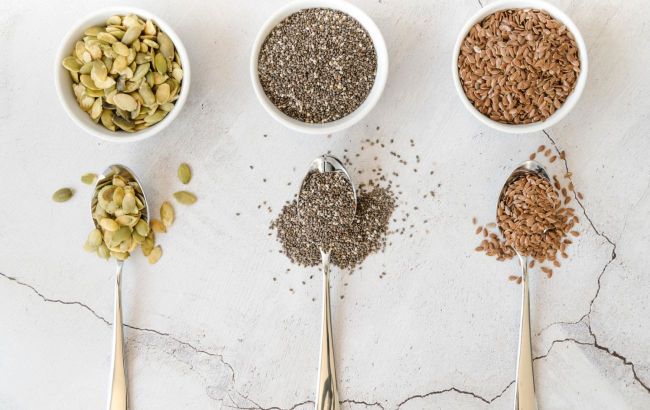6 types of seeds to support heart health and lower cholesterol
 Illustrative photo (Freepik)
Illustrative photo (Freepik)
It's no secret that any kind of seed packs a powerful punch when it comes to health benefits. Laden with a myriad of amino acids, these tiny powerhouses bolster heart health while providing a rich dose of proteins and essential microelements.
In particular, there are six types of seeds that should find their way into everyone's daily diet, according to Eat This, Not That.
Chia seeds
Chia seeds are a nutritional goldmine. Just a serving of 2 tablespoons offers 9 grams of fiber, 4 grams of protein, and a significant array of microelements including iron, magnesium, phosphorus, and zinc.
A 2021 meta-analysis revealed that chia seeds are a plant-based source of omega-3 fatty acids, crucial for maintaining heart health by lowering bad cholesterol and boosting good cholesterol. Moreover, they have been shown to lower blood pressure in individuals with type 2 diabetes.
Flaxseeds
A 2-tablespoon serving of flaxseeds contains 4 grams of fiber, 2.5 grams of protein, and 6 grams of healthy omega-3 fatty acids. Flaxseeds can aid in reducing cravings, diversifying gut microbiota, lowering systolic and diastolic blood pressure, and mitigating blood sugar spikes after carb-rich meals.
Flaxseeds also pack several essential microelements such as copper, manganese, and magnesium.
Hemp seeds
We're talking about non-psychoactive hemp seeds here. Rich in healthy fats, hemp seeds boast an optimal ratio (3:1) of omega-6 to omega-3 fatty acids, which help prevent cardiovascular diseases.
A 3-tablespoon serving contains 10 grams of complete protein, along with phosphorus, magnesium, thiamine, and 100% of your daily manganese requirement.
Quinoa
According to a 2020 meta-analysis, incorporating quinoa into your diet can support heart health by reducing the risk of cardiovascular diseases and lowering levels of bad cholesterol and blood insulin. Quinoa is an excellent source of protein and carbohydrates, making it a versatile addition to daily meals.
Sesame seeds
Sesame seeds are a good source of vitamins B1, B3, and B6. Vitamin B6 is crucial for the metabolism of carbohydrates, fats, and proteins. Additionally, lignans found in sesame seeds possess anti-inflammatory and anticancer properties.
Sesame seeds can be consumed whole or ground.
Pumpkin seeds
A 13-gram serving of pumpkin seeds contains 8 grams of protein and 40% of your daily magnesium requirement. They're also a rich source of zinc, phosphorus, potassium, selenium, antioxidants, and healthy polyunsaturated and monounsaturated fatty acids.
These seeds can be sprinkled onto salads, soups, or baked goods for an added health boost.
This material is for informational purposes only and should not be used for medical diagnosis or self-treatment. Our goal is to provide readers with accurate information about symptoms, causes, and methods of detecting diseases. RBС-Ukraine is not responsible for any diagnoses that readers may make based on materials from the resource. We do not recommend self-treatment and advise consulting a doctor in case of any health concerns.

